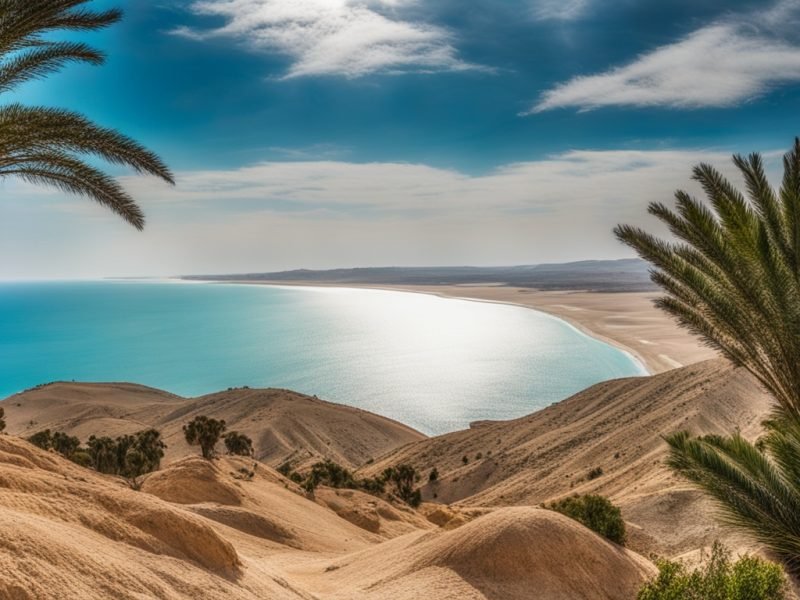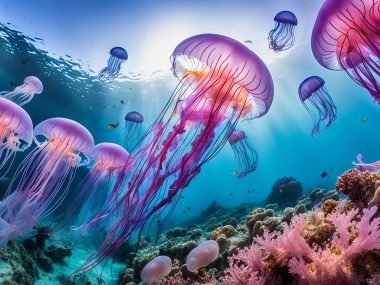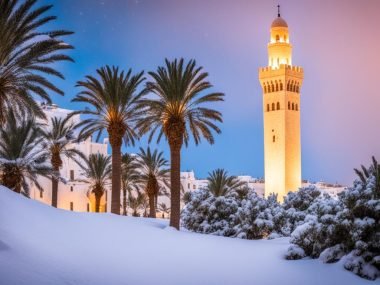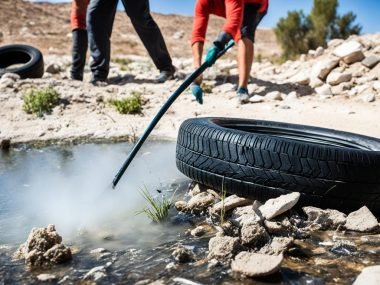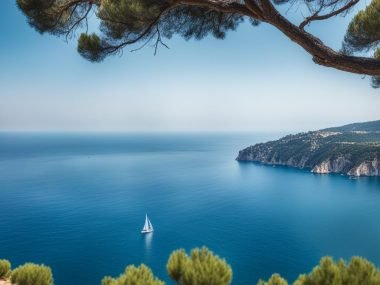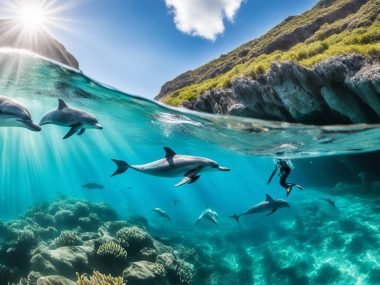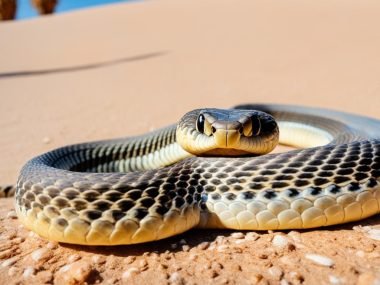Tunisia is a country in North Africa. It is big, covering over 163,610 square miles. It has many natural resources like petroleum and phosphates. These resources help Tunisia’s economy. The country is also beautiful with places like Djerba and Sousse. These attract tourists from all over the world.
Tunisia is next to Algeria, Libya, and the sea. It has lots of farms. But, it faces challenges like soil erosion and not enough fresh water.
Tunisia’s economy grows with help from exports, foreign investment, and tourism. This growth comes especially from the European Union. After its revolution, Tunisia has been working to get more investment. It focuses on balanced development. The country’s service sector, especially tourism, is very important. Tunisia is also working on using more renewable energy. This is part of managing the effects of changing fuel subsidies.
Key Takeaways
- Tunisia has many natural resources, including petroleum, phosphates, and metals.
- Farming is important but faces issues like soil erosion and lack of water.
- Exports, investment, and tourism help Tunisia’s economy grow.
- Tourism is important for the economy.
- Tunisia is working on increasing renewable energy use.
Overview of Tunisia’s Natural Resources
Tunisia has a wide range of natural resources. They are linked with its varied geography. It spans from the Mediterranean coast to the Sahara desert. This diversity helps the economy a lot.
Geographical Context
Tunisia enjoys benefits from its geography. It has fertile lands and dry areas too. The coast supports sea activities and tourism. The Sahara is perfect for solar energy. This landscape gives Tunisia many natural benefits. It’s both rich in resources and beautiful.
Economic Importance
Tunisia’s natural resources help many key areas of its economy. Farming is very important, with a lot of olive and citrus growing. Mining for phosphates and iron ore boosts industry. The lovely scenery also attracts tourists. This adds a lot to the economy.
Environmental Challenges
But Tunisia has to deal with environmental issues. Pollution, cutting down trees, and not enough water are big problems. To fight these, Tunisia has made strict laws. They focus on saving energy and using renewable sources. They also started the National Fund for Energy Management. This is to help create a better future.
Mineral Resources in Tunisia
Tunisia is rich in minerals, with phosphates leading. These minerals are important for many industries around the world.
Phosphates
Phosphates have been mined in Tunisia for a long time. They help make fertilisers. This is key for farming all over the world.
Iron Ore, Lead, Zinc, and Salt
Tunisia also has iron ore, lead, zinc, and salt. These aren’t as common as in other places. But they are still very important.
Iron and zinc are used in building and making things. Salt is used in homes and factories.
Mining Industry Challenges
Mining in Tunisia is hard. There’s the worry of running out of resources. And mining can hurt the environment.
Also, prices change a lot in the world market. This makes it hard to earn money.
Petroleum and Natural Gas
Tunisia’s energy sources are very important for its economy. Finding petroleum, especially in the south, changed its economy a lot. Fields like Al-Burmah and Ashtart are very important in Tunisia’s oil sector.
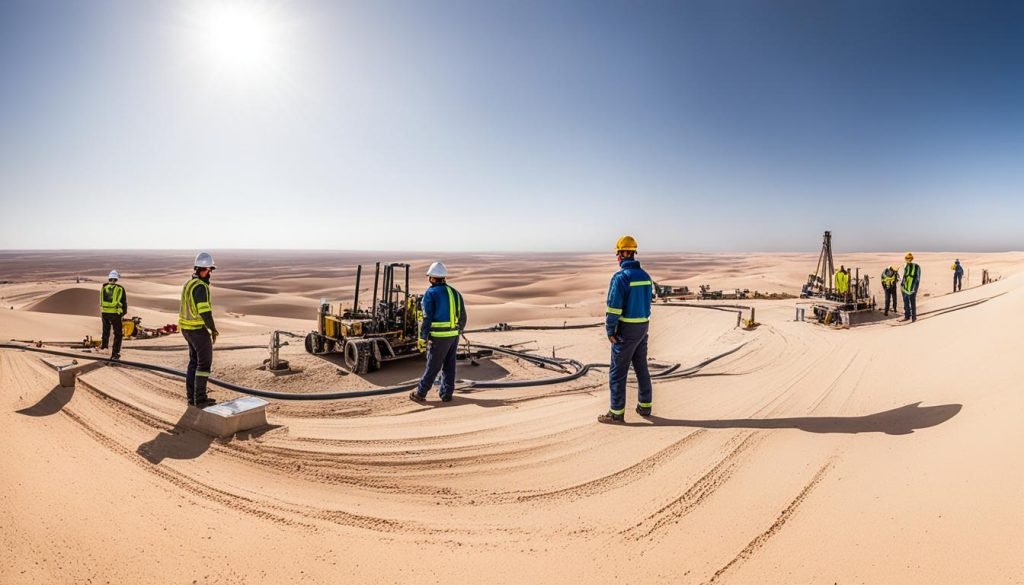
The Role of the Petroleum Sector
The petroleum sector is key for Tunisia’s economy. Even though production has dropped, working on smaller fields helps keep oil flow steady. This sector helps a lot because of money from pipeline use, showing oil’s big role in Tunisia.
Significant Oil Fields
Big oil fields like Al-Burmah and Ashtart have boosted Tunisia’s economy. Their discovery led to more growth and better infrastructure. Now, there’s more focus on getting oil from existing spots and finding new ones to help Tunisia’s oil output.
Natural Gas Reserves and Production
Natural gas in Tunisia is growing fast, thanks to the Miskar field. This helps Tunisia rely more on its own gas. Though its gas reserves are small, looking for and getting gas out is very important. Money from gas pipelines also shows how key gas production is for Tunisia’s economy.
The oil and gas sectors together support Tunisia’s energy needs. They help keep the economy stable and growing.
Tunisia’s Agricultural Resources
Agriculture is very important in Tunisia. It helps our economy a lot by increasing GDP and jobs. The land for farming here covers about 18.7% of Tunisia. From 2010 to 2014, farming here really grew, showing it’s more and more important.
In Tunisia, we grow lots of different crops like olives, tomatoes, and citrus fruits. Olives are very important. They are not only eaten here but also sold to other countries. Farming many kinds of crops is very important for our country’s money.
We’re always trying to make farming better so we can sell more. Farming is key for our country. It helps a lot of people live and have jobs. We make plans to make sure farming on our land is really good.
The Significance of Olive Production
Olive trees are very important to Tunisia. They cover large areas, especially in the north. These trees are key to the landscape and help many Tunisians make a living.
Historical Context of Olive Farming
Olive farming in Tunisia has a long history. It goes back to the ancient Carthaginians. This practice continued through the Roman times and still exists today. This shows how important olives are to Tunisia’s heritage.
Economic Impact of Olive Oil
Tunisia is a top olive oil maker in the world. This industry hugely helps Tunisia’s economy. It provides jobs for many people.
Tunisian olive oil is known for its high quality. It is in demand worldwide. This boosts Tunisia’s exports. With more investment, olive farming in Tunisia could keep growing.
Water Resources and Fisheries
Tunisia is facing issues with its water because of too much use and environmental problems. These water sources are vital for farming and daily use. It’s very important to manage Tunisia’s aquatic resources well to support life and the economy. The fishing industry in Tunisia, mainly in the Mediterranean Sea, boosts the economy a lot.
The government is focusing on sustainable fisheries in Tunisia. They are working on several plans to use these resources smartly. Introducing better fishing methods and rules are important steps. These help protect Tunisia’s aquatic resources for eating and making money.
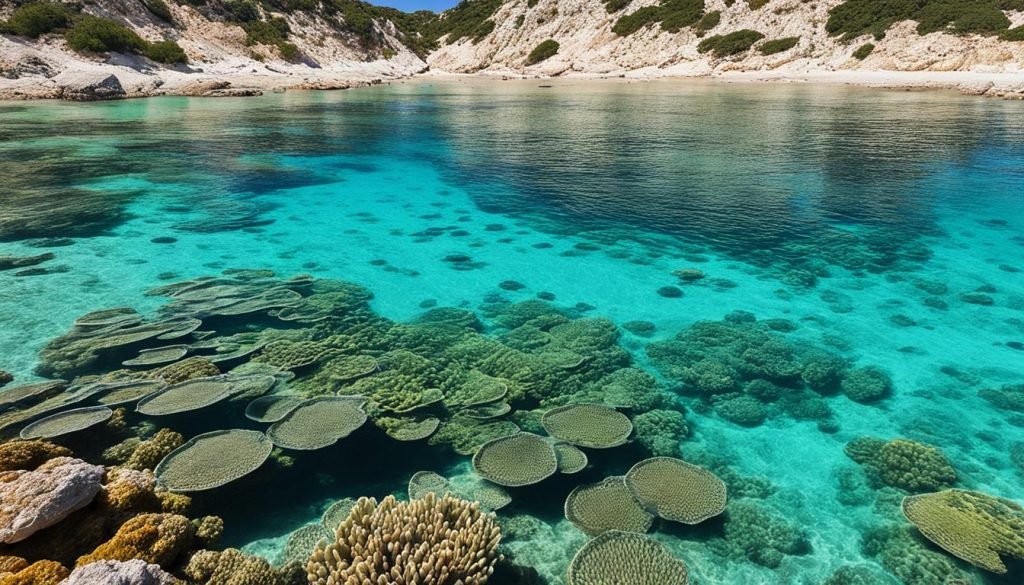
The money made from Tunisian fisheries is very important. It helps the economy grow a lot. Everyone wants to keep the supply steady by fishing responsibly. This way, sustainable fisheries in Tunisia aim to safeguard resources for the future. As we look into how environmental problems affect us, keeping up our commitment to sustainable fisheries in Tunisia is key. It’s important for both our economy and keeping our environment safe.
What Are The Natural Resources In Tunisia?
Tunisia is rich in natural resources. These include its varied lands and new renewable energy sources. These resources are key for Tunisia’s growth and caring for the environment.
Land Utilisation
Tunisia uses its land in many ways. The coastal plains are fertile and great for farming. They grow olives, cereals, and veggies here. The dry areas are for herding and getting resources.
| Type of Land Use | Area Coverage (%) | Main Activities |
|---|---|---|
| Agricultural Land | 18.7% | Crop Cultivation |
| Urban and Industrial Areas | 2.1% | Urban Development, Manufacturing |
| Desert and Arid Zones | 79.2% | Pastoralism, Resource Extraction |
Renewable Energy Potential
Tunisia is embracing renewable energy for its future. It’s investing in solar and wind power. This move shows Tunisia’s dedication to sustainable growth and less reliance on imported energy.
The goal is a balanced energy mix that supports Tunisia’s development. This is vital for cutting greenhouse gas emissions and ensuring economic stability despite global energy changes.
The Role of Natural Resources in Tunisian Exports
Tunisia is known worldwide because of its natural resources. Olives and olive oil help a lot in this. They make Tunisia’s exports very popular for quality.
Minerals like phosphates and ores are important too. Petroleum and natural gas play a big part in the economy. They all help Tunisia earn money from other countries. This makes the economy strong and able to handle tough times better.
Let’s look at the main things Tunisia exports and how they affect trade:
| Commodity | Export Value (USD million) | Global Market Share (%) |
|---|---|---|
| Olives and Olive Oil | 521 | 8.1 |
| Phosphates | 450 | 4.5 |
| Petroleum | 349 | 1.7 |
| Natural Gas | 282 | 2.3 |
| Iron Ore and Zinc | 198 | 3.2 |
Good planning and government actions have boosted Tunisia’s exports. It’s clear these resources are key for growing the economy through exports.
Conclusion
Tunisia has many natural gifts that help its economy strong. These gifts support various important economic areas. They are vital for the nation’s wealth and its people’s jobs.
For a better economy, Tunisia must explore different ways to grow. It’s crucial to use more solar and wind power. The government is already investing in these energy types. This helps Tunisia lead in green energy in its region.
Keeping nature safe is also a must. Tunisia needs to find smarter ways to use its gifts. Efforts include saving water and reducing harm to the land. Balancing use and care of natural gifts will protect them for the future.
Our look at Tunisia shows efforts to blend economic growth with caring for nature are key. This balance will help Tunisia face future challenges well. It’s about growing while protecting nature’s treasures.

